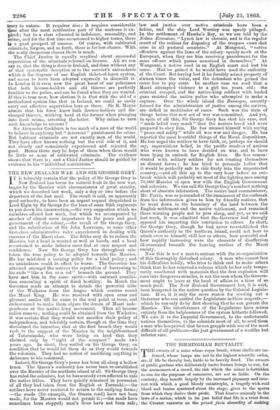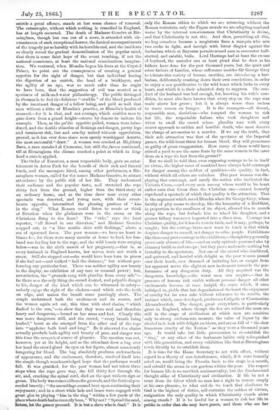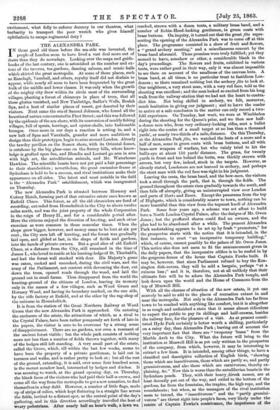THE BIRMINGHAM BRUTALITY.
THE owners of a mine whose ropes break, whose shafts are un- fenced, whose lamps are not in the highest scientific order, are, if life be thereby lost, liable to be heavily fined. The owners of public gardens who deliberately incite human beings to run, for the amusement of a crowd, the risk which the miner is forbidden to run for the purposes of commerce, are not so liable. On the contrary, they benefit largely by the increased piquancy and inte- rest with which a good bloody catastrophe, a tragedy with real blood and brains spattered about the stage, gives to the sports from which they derive their profit. That bizarre anomaly in the laws of a nation, which in its just belief that life is a trust froni the Creator ventures on the prima fade absurdity of making suicide a penal offence, stands at last some chance of removal. The catastrophe, without which nothing is remedied in England, has at length occurred. The death of Madame Geneive at Bir- mingham, though but one out of a score, is attended with cir- cumstances of such exceptional horror, the farcical accompaniments of the tragedy jar so harshly with its horrible end, and the incidents so clearly reveal the gradual demoralization of the popular mind, that there is some faint hope of the event touching, if not the national conscience, at least the national conscientious imagina- tion. We ventured, when Blondin began his feats at the CrystA Palace, to point out the consequences of creating a general appetite for the sight of danger, but that individual having the digestion of an ostrich, the head of a bricklayer, and the agility of an ape, was so much safer than he ought to have been, that the suggestion of evil was scouted as a specimea of milk-and-water philanthropy. The public thronged in thousands to feel the delicious " cruddle " of the blood produced by the imminent danger of a fellow being, and paid so well that men without a tithe of Blondin's practice, or Blondin's health of stomach—for it is that, and not courage, which enables men to gaze down from a grand height—strove by dozens to imitate his example. Then, as the pu'Aic appetite palled, women were intro- duced, and the double stimulus of fleehings and danger, pretty legs and imminent risk, lust and cruelty united without opprobrium, proved, as it has ever done since men openly worshipped Astarte, the most successful " draw." A woman was crushed at Highbury Barn, a man smashed a Cremorne, but still the furore continued, till at Birmingham the disease reached a point at which in Eng- land a cure is applied.
The Order of Foresters, a most respectable body, gave an enter- tainment in Aston Park for the benefit of their sick and funeral funds, and the managers hired, among other performers, a Bir- mingham woman, called for the nonce Madame Geneive, to attract attendance by the public risk of her life. They understood their audience and the popular taste, and stretched the rope thirty feet from the ground, higher than the third-story of an ordinary house, and as the time drew near every other spectacle was deserted, and young men, with their sweet- hearts opposite, intermitted the pleasing pastime of "kiss in the ring." What Roman could listen to music or think of flirtation when the gladiators were in the arena or the Christians flung to the lions? The "tide," says the local reporter, "all flowed in one direction," and Madame Geneive stepped out, in "a blue muslin skirt with fleshings," above a sea of upturned faces. The poor woman—we have no heart to blame her, for there were many mouths at home to feed, her hus- band was leading her to the rope, and the wild beasts were surging below—was in the sixth month of her pregnancy,—that is, as every husband in England knows, her nerves were not worth a straw. Still she stepped out—she would have been torn to pieces if she had not—and walked " half the distance," but without per- forming any particular feat. There was neither agility nor beauty in the display, no exhibition of any rare or unusual power ; but, nevertheless, the "grounds rang with plaudits from every side"— for there ?vas the only thing the crowd desired, real palpable danger to lire, danger of the kind which can be witnessed in safety— nobody enjoys the sight of the cholera—and which sets the teeth on edge, and makes the breath come pantingly short. The couple understood both the excitement and its source, and the woman again set out, this time with steel chains, "which flashed in the sun,"—to show that they were real, and therefore heavy and dangerous,—bound on her arms and feet. Clearly this was more dangerous still, and the crowd, "every breath being hushed," burst as she emerged from the other end of the rope
into "applause both loud and long." Be it observed the chains actually preclude both agility and beauty of pose, and danger was
this time the recoynized source of pleasure. The emotion was not,
however, yet at its height, and as the attendant drew a bag over her head the crowd glued itts eyes on her figure, almost consciously hungering for blood. The bag absolutely produces awkwardness of appearance, and the excitement, therefore, resolved itself into the simple though unacknowledged hope that the performer would fall. It was gratified, for the poor woman had not taken three steps when the rope gave way, she fell thirty feet through the air, and, cracking the spinal cord, died on the spot without sign or groan. The body was removed from the grounds, and the festival pro- ceeded bravely; "the assemblage seemed bent upon continuing their enjoyment ; and in a short while lads and lasses were engaged with great glee in playing "kiss in the ring" within a few yards of the place where death had so recently been." Why not? "Spread the semi, lictors, let the games proceed. It is but a slave who is dead." It is
only the Roman ethics to which we arc returning without the Roman restraints, only the Pagan morals we are adopting rendered worse by the internal consciousness that Christianity is divine, and that Christianity is not this. And then, permitting all this, we hug ourselves because a 'magistrate fines a marquis who sets two cocks to 'fight, and inveigh with bitter disgust against, the barbarism which at Bayonne permits armed men to encounter half- starved, and eatable, bulls. Lord Hastings had at least the excuse of boyhood, the matador can at least plead that he dote as his fathers have done for the past thousand years, but the quiet and sober fathers of families, whose sufferance enables Sir George Grey to tolerate this variety of human sacrifice, are introducing a bar- barism, deliberately crushing down their own convictions, in order to enjoy a new gratification to the wild beast which lurks in every heart, and which it is their admitted duty to suppress. The con- duct of the husband was lead enough, for, knowing his wife's con- dition, he must also have known that every step on the rope was made above her grave ; but it is always worse than useless to waste reason on hunger. It is the managers—all decent, responsible men, doubtless—who tempted the woman to risk her life, the respectable fathers who took daughters and wives to swell the crowd whose plaudits rose with every nearer approach to sudden and horrible death, who most deserve the charge of accessories to a murder. If we say the truth, that their sole attraction was that of the spectator at the Imperial games, the wild-beast thirst for human blood, they will pronounce us guilty of gross exaggeration. How many of them would have stirred a yard to see the same feats by the same woman in the tame dress on a rope six feet from the ground?
But we shall be told that, even supposing courage to be in itself no virtue, the higher races of mankind have always held contempt for danger among the noblest of qualities—the quality, in fact, without which all others are valueless. This poor woman was dis- playing that contempt, and surely the nation who instituted the Victoria Cross,—and every man among whom would in his heart rather earn that Cross than the Christian one—cannot honestly reprehend a spectacle of which that quality is the attraction. That is the argument which saved Blondin when Sir George Grey, whose faculty of pity seems to develop, like the humanity of a Buddhist, in proportion to the smallness of its object, allowed him to march along the rope, but forbade him to wheel his daughter, and a I grosser fallacy was never imported into a discu.:sion. Courage is a Christian quality, for it has its root in faith, and it may, perhaps, be taught ; but the courage brave men want to teach is that which despises danger to oneself, not danger to other people. Exhibitions like these may prove courage in the exhibitors,—though they generally prove only absence of bile,—and an early aptitude possessed also by chimney builders and sweeps ; but they prove and excite nothing but brutality in the spectators. Not one of the crowd who shuddered, and quivered, and howled with delight as the poor woman passed over their heads, ever dreamed of imitating her, or caught from her apparent nerve the slightest new incitement towards the parr formance of any dangerous duty. All they acquired was the dangerous knowledge,—the worst men can acquire,—that in presence of human risk visible without personal danger all other excitements become at once insipid, the crave which, if once indulged in, yields that last degrada.tionof the heart the enjoyment of cruelty for its own sake without reference to its results, the instinct which, once developed, produces a Caligula or Coustantine Alexandrovitch. The danger, great everywhere, is particularly
great in England, where though the few are refined the mass are still in the stage of civilization at which men are sensitive
only to strong excitements, measure the value of liquor by the alcohol in it, look with delight on blows, and are as full of "the slow humorous cruelty of the Teuton" as they were a thousand years ago. It would take but little provocation to re-establish the "ring," or any other of the barbarous habits only relinquished with this generation, and every exhibition like that at Birmingham tends directly to re-establish them.
It is time for the Home Secretary to act with effect, without regard to a theory of non-interference, which, if it were honestly acted on, would bring the Floralia back to the stage in a month, and rebuild the arena in our gardens within the year. The respect for human life is no mawkish sentimentality, but the fundamental thought alike of Christianity and civilization. If life be not a trust from its Giver which no man has a right to restore simply at his own pleasure, to what end do we teach that obedience to God is the highest of duties, self-restraint the noblest of virtues, resignation the only quality in which Christianity stands alone among creeds ? If it be lawful for a woman to risk her life in public in order that she may have pence, and those who see her excitement, what folly to enforce decency in our theatres, what barbarity to transport the poor wretch who gives himself ophthalmia to escape regimental duty ?
































 Previous page
Previous page